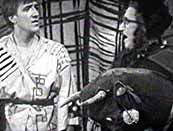 There are several reasons why programmes from the past have been lost. They affect all broadcasters from that time.
There are several reasons why programmes from the past have been lost. They affect all broadcasters from that time.
Forty years ago, few people foresaw the long term cultural and historical value of television and radio programmes - or their commercial potential. The future significance of popular culture such as comedy or pop music was particularly underestimated.
Right up until the 1970s, many television and radio broadcasts frequently went out live and unrecorded. For years the only television recording technology was film, and filming was too expensive just to keep programmes in the vaults.
Video tape was introduced in the mid-1960s, but was still vastly more expensive than today’s cheap home technology. It wasn’t seen as a permanent store for television programmes. But the tapes could be used again to make other programmes - and many were.
Sometimes only samples or extracts of radio programmes were kept.
Sometimes programmes were heavily restricted by copyright and rights considerations. Such programmes could not be repeated. They were thought to have no further use and often not kept. But the BBC would now be willing to re-negotiate those rights, or to preserve the programmes for the social history value alone.
